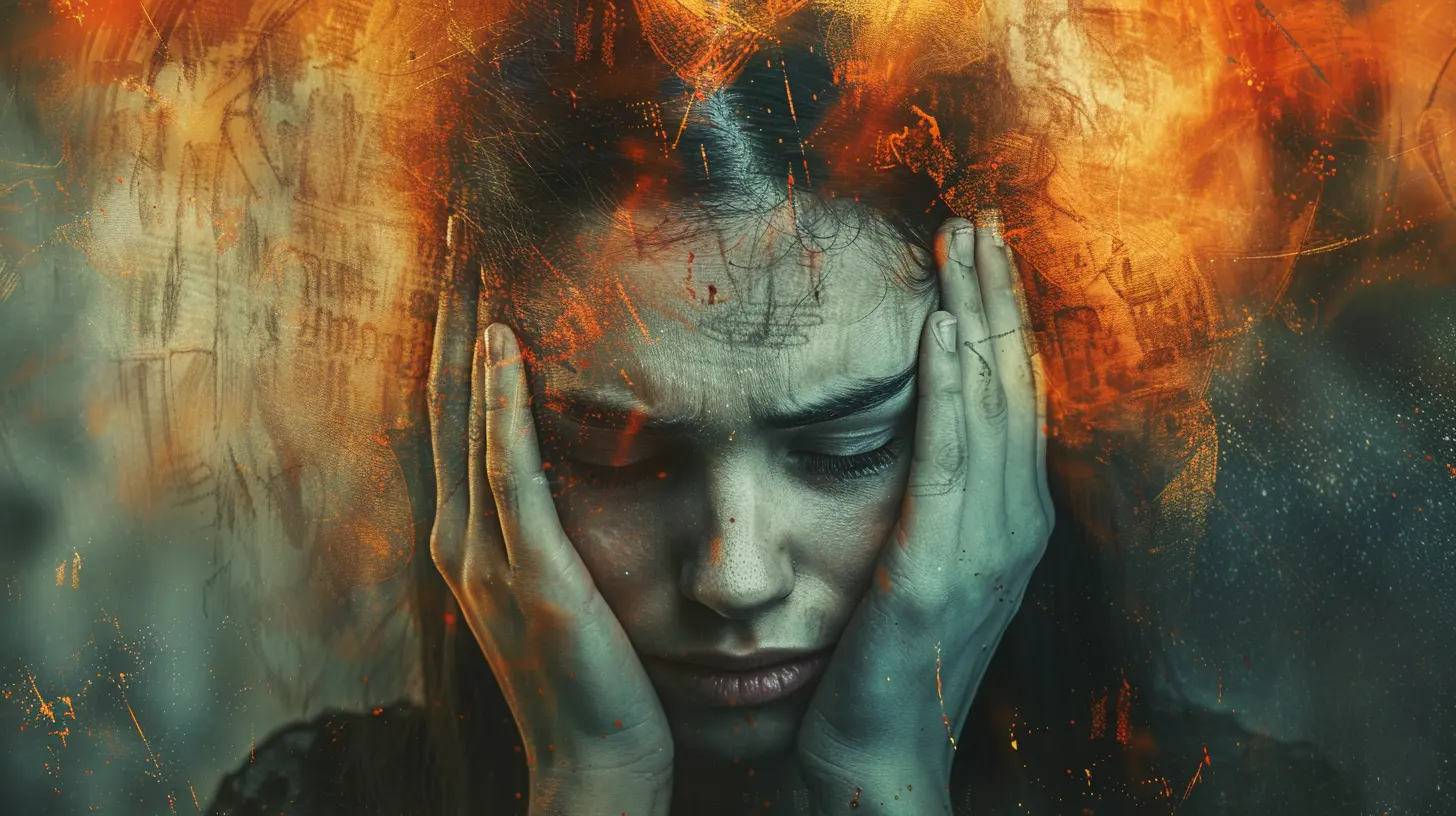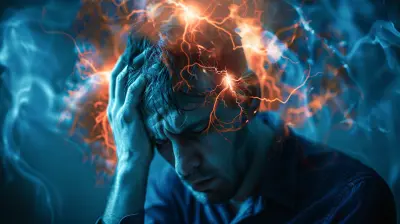Healing Trauma: Understanding the Anxiety Connection
19 April 2025
Trauma is like an invisible wound—it may not always be seen, but its impact runs deep. For many, trauma doesn't just exist as a distant memory; it manifests in daily life, often as anxiety. If you've ever felt on edge for no apparent reason, struggled with constant worry, or experienced panic seemingly out of nowhere, your past experiences may be playing a bigger role than you realize.
In this article, we’ll break down the connection between trauma and anxiety, how it affects your body and mind, and most importantly—how to heal.

What Is Trauma?
Before we dive into the anxiety connection, let's get clear on what trauma actually is.Trauma isn't just about experiencing a life-threatening event. It can stem from anything that overwhelms your ability to cope—abuse, neglect, a breakup, financial struggles, or even emotional abandonment. Trauma is personal—what deeply affects one person may not affect another in the same way.
There are three main types of trauma:
- Acute Trauma: A single distressing event, like an accident or assault.
- Chronic Trauma: Repeated exposure to distress, such as ongoing abuse or toxic relationships.
- Complex Trauma: A mix of traumatic experiences over time, often starting in childhood.
Regardless of the type, trauma can leave a lasting imprint on your nervous system, leading to chronic stress and anxiety.

How Trauma Triggers Anxiety
1. Your Brain Stays in Survival Mode
Our brains are wired for survival. When you experience trauma, your brain kicks into "fight, flight, or freeze" mode. Ideally, once the danger passes, your brain should return to a calm state. But when trauma isn’t fully processed, the brain stays stuck in that heightened state—constantly scanning for threats. This can result in chronic anxiety, making you feel like you're always on edge, even in safe situations.2. Overactive Amygdala = Constant Fear
The amygdala is the brain's fear center. Trauma can make it hyperactive, meaning it overreacts to normal stressors. Imagine your amygdala as a smoke detector—after trauma, even a little toast burning in the toaster (minor stress) can set off a full-blown alarm (anxiety attack).3. Weakened Prefrontal Cortex = Less Logic, More Worry
The prefrontal cortex helps with rational thinking and decision-making. In trauma survivors, this part of the brain can become weaker, making it harder to control anxious thoughts. You may find yourself stuck in worry loops, overthinking every situation, or struggling with irrational fears.4. Dysregulated Nervous System = Physical Symptoms
Trauma affects the autonomic nervous system, which controls involuntary functions like heart rate and digestion. Many people with trauma-related anxiety experience:- Rapid heartbeat
- Shortness of breath
- Digestive issues
- Insomnia
- Muscle tension
This is because the body is still reacting to past trauma, even when no real danger is present.

How to Heal Trauma-Related Anxiety
Healing from trauma isn't about "just getting over it." It's about rewiring your brain and body to feel safe again. Here are some effective steps to begin your healing journey:1. Therapy: The Power of Reprocessing
Therapy is one of the most effective ways to heal trauma-related anxiety. Some of the best approaches include:- EMDR (Eye Movement Desensitization and Reprocessing): A powerful technique that helps reprocess traumatic memories so they no longer trigger anxiety.
- Cognitive Behavioral Therapy (CBT): Helps you challenge and change anxiety-provoking thoughts.
- Somatic Therapy: Focuses on releasing trauma stored in the body through movement and breathwork.
2. Regulating Your Nervous System
Since trauma dysregulates the nervous system, it’s important to retrain it. Some ways to do this include:- Breathwork: Deep breathing helps activate the parasympathetic nervous system (your body's relaxation response).
- Cold Therapy: Taking cold showers or splashing cold water on your face can reduce anxiety instantly.
- Grounding Exercises: Simple activities like walking barefoot on grass or holding an object can bring you back to the present moment.
3. Breaking the Anxiety Cycle
If trauma has wired your brain for anxiety, breaking the loop is key. Try:- Journaling: Writing down your thoughts can help process emotions and identify triggers.
- Mindfulness & Meditation: Training your mind to stay in the present reduces overthinking.
- Movement & Exercise: Moving your body, whether through yoga, dancing, or walking, helps release stored trauma.
4. Inner Child Healing
Many trauma survivors carry wounds from childhood that fuel their anxiety. Inner child work involves reconnecting with the younger version of yourself who experienced the trauma, offering them the love and reassurance they never received. This can be done through:- Speaking words of affirmation to your younger self
- Writing a letter to your inner child
- Visualizing your inner child and comforting them
5. Nutritional & Lifestyle Support
Your physical health plays a huge role in anxiety levels. Here are some ways to support your healing:- Reduce caffeine & sugar: These can spike anxiety levels.
- Supplement with magnesium & omega-3s: These nutrients support brain health and reduce anxiety.
- Prioritize sleep: Poor sleep worsens anxiety, so creating a calming nighttime routine is essential.
6. Building a Sense of Safety
One of the biggest impacts of trauma is that it makes your body feel unsafe. Creating safety in your environment and relationships can help heal anxiety. Try:- Setting boundaries with toxic people or situations
- Surrounding yourself with support—friends, family, or a therapist
- Engaging in comforting activities like weighted blankets, soothing music, or aromatherapy

Final Thoughts
Healing trauma-related anxiety is a journey—it won’t happen overnight, but it is possible. The key is patience and self-compassion. Remember, your brain and body are not broken—they're just trying to protect you based on past experiences. With the right tools, support, and inner work, you can rewire your nervous system, quiet the anxiety, and finally feel safe in your own skin.If you’ve struggled with trauma and anxiety, know that you're not alone. Healing is within reach, and every small step you take brings you closer to the peace you deserve.
all images in this post were generated using AI tools
Category:
AnxietyAuthor:

Alexandra Butler
Discussion
rate this article
4 comments
Lila McLanahan
Thank you for shedding light on the intricate relationship between trauma and anxiety. Your insights provide a compassionate pathway for those struggling with these challenges. It's crucial to remember that healing is a journey, and understanding is the first step toward finding peace.
May 12, 2025 at 4:46 PM

Alexandra Butler
Thank you for your kind words! I'm glad the article resonated with you and emphasized the importance of understanding in the healing journey.
Quinn Sullivan
Understanding trauma's link to anxiety is essential for effective healing and personal growth.
May 4, 2025 at 4:44 AM

Alexandra Butler
Thank you for highlighting this crucial connection! Understanding trauma's impact on anxiety truly is key to facilitating healing and fostering personal growth.
Kristina Thompson
Healing from trauma requires patience and self-compassion. Acknowledging anxiety as a common response can empower individuals to explore their feelings, fostering resilience. Embracing this journey promotes not only understanding but also profound personal growth and healing.
April 29, 2025 at 4:11 AM

Alexandra Butler
Thank you for your insightful comment! I completely agree that patience, self-compassion, and acknowledgment of anxiety are crucial for healing and personal growth.
Renee McGinnis
Embrace healing; anxiety is a path to strength!
April 22, 2025 at 2:38 AM

Alexandra Butler
Thank you! Embracing anxiety as part of the healing journey can indeed lead to resilience and strength.



